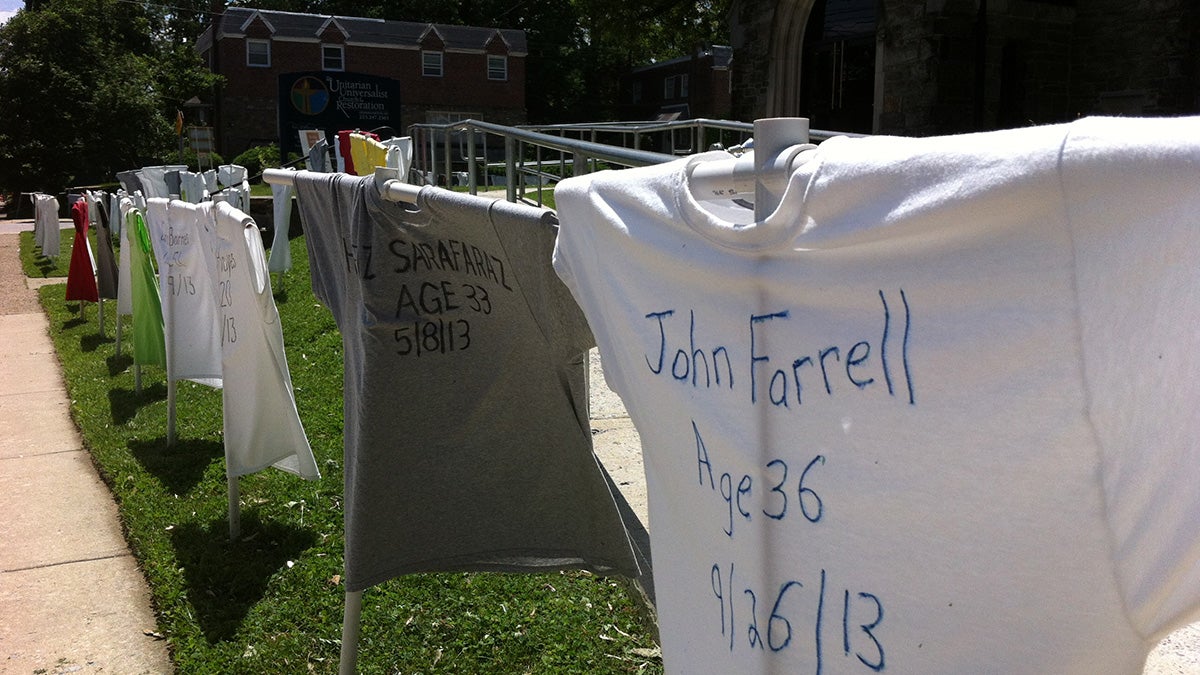Seattle college shooting and the ghosts of Philadelphia
Listen
The T-shirt Memorial lists the names of the 201 people killed by guns in Philadelphia in 2013 at the Unitarian Universalist Church of the Restoration in Mt. Airy (Solomon Jones/ for NewsWorks)
On Thursday when I learned that one person was killed and three others wounded in a shooting at Seattle Pacific University, I was numb.
In a country where incidents like the Seattle college shooting are commonplace, it’s hard to feel anything anymore. We shake our heads, count the bodies and add them to the statistics. But I know firsthand that shooting victims are not numbers. They’re people.
All too familiar
I have known young men who’ve died from gun violence.
I have seen the toxic pain and rage on the face of a grieving father.
I have witnessed the vacant look of grief in the eyes of a mourning mother.
I know that one instance of gun violence can scar entire families.
Yet even I have fallen into the habit of tallying scores, as if gun violence is a game.
Here in Philadelphia, where shooting deaths were down nearly 30 percent last year (PDF, page 7), there is a chorus of voices shouting that we’ve turned the corner.
For a moment, I was ready to believe them, but that was before I saw the T-shirts.
Jarring sight
At first I didn’t notice them.
I would drive along Stenton Avenue in Philadelphia’s Mt. Airy, glancing at the grassy expanse in front of the Unitarian Universalist Church of the Restoration. I’d occasionally look at the 201 T-shirts mounted on makeshift crosses. When a car passed, I’d watch the T-shirts billow like sails, or ripple ever so slightly.
These T-shirts moved like ghosts, and in a way, they were exactly that.
Each one bore a handwritten name, age and date.
Each represented a Philadelphian who’d been shot to death in 2013.
Each commemorated a life.
The display was arranged by an organization called Heeding God’s Call, a group of faith communities that banded together to curb illegal gun trafficking. Their focus is preventing straw purchasing, an illegal act that occurs when a person buys guns for resale to those who can’t buy them legally.
The group has protested at gun shops. That’s been effective, in its way. But there was something about the sight of those T-shirts hanging on makeshift crosses.
There was nothing neat about the display; nothing loud or ostentatious. There were simply the names of the dead, and the empty shirts they could have worn had they lived.
I tried to contact the organization to ask about the memorial, but there was no answer. However, there was a stack of flyers near the display. I took one. It said, in part, “Each name represents a whole person, a child of God. Each one deserves to be remembered. Each death deserves to be noted and mourned.”
I agree.
More than statistics
For years, we have counted shooting deaths meticulously. We have calculated and analyzed and measured the statistical trends.
But have we remembered names like Ryan Brown, a 22-year-old shooting victim who died three days before Christmas?
Have we mourned the loss of Brandon Payton, shot dead at the age of 23?
Have we looked at shooting victims as whole people, or have we simply reduced them to numbers?
Maybe it’s easier to ignore the reality of gun violence if we simply count the bodies.
Perhaps if we see victims as numbers, we won’t see them as equivalent to ourselves.
Maybe we can even pretend that we are somehow invincible — that guns could never get to us.
But when we stop counting and compiling statistics, when we stop long enough to see a whole person, we see that gun violence is everyone’s problem. The name on the next T-shirt could very well be ours.
That alone should be enough to make us act.
—
Read more at Solomon Jones’ website.
WHYY is your source for fact-based, in-depth journalism and information. As a nonprofit organization, we rely on financial support from readers like you. Please give today.


